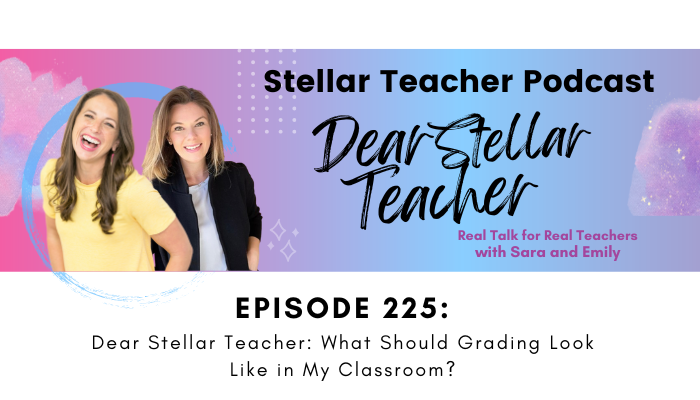
Click play below to listen to some grading tips and ideas.
Welcome to this month’s episode of Dear Stellar Teacher! We’re kicking things off with a heartwarming story straight from our Stellar Literacy Collective Facebook community, where fifth and sixth-grade teacher Rebecca shares an inspiring classroom win. At her new school, Rebecca has been using our whole group lessons, including a powerful poetry lesson on The Invisible Backpack, a lesson designed to help students understand that everyone carries unseen challenges or struggles. She had her students reflect on it through a thoughtful writing prompt—a moment that brought both empathy and comprehension to the forefront of learning and allowed her to make personal connections with her students.
In today’s episode, we’re unpacking one of teaching’s biggest balancing acts: grading. Teachers often wonder how many grades to take, what to grade, and the type of feedback to offer. We’ll talk about balancing grading requirements with meaningful assessments, helping you reduce pressure while still providing valuable insights for your students. Our goal? To streamline your grading process so it’s not just about checking boxes but rather about fostering growth and understanding. One tip we discuss is how to use in-class grading for instant feedback—an approach that saves time and boosts student engagement.
It’s important to keep in mind that grades are more than just numbers in a grade book; they’re a way to communicate progress and provide feedback that supports student growth. By staying intentional about what and when we grade, we can shift our focus from merely fulfilling requirements to fostering a more meaningful learning experience. Instead of letting grading become a burdensome task, let’s remember that it’s an opportunity to guide, encourage, and celebrate each student’s journey.
Do you have a burning question you want us to explore on the podcast? Or maybe you have an amazing story that deserves a shout-out? We’d be thrilled to feature your question or stellar story on the show! Just shoot us an email at [email protected]. We can’t wait to hear from you!
In this episode on grading, we share:
- Personal stories and grading struggles from when we were in the classroom.
- Practical strategies to meet your district’s grading requirements without burning yourself out.
- Ideas on ways to provide efficient and meaningful feedback to your students.
- Things to keep in mind when deciding your grading routines.
Resources:
- Join The Stellar Literacy Collective
- Sign up for my Private Podcast: Confident Writer Systems Series
- Sign up for my FREE Revision Made Easy email series
- If you’re enjoying this podcast, please leave a review on Apple Podcasts!
- To find The Invisible Backpack lesson in the Stellar Literacy Collective:
- Click the “Whole Group” icon in the black bar.
- Click on the “Figurative Language” thumbnail.
- Scroll down to the 5th Grade Whole Group Lessons.
- Click “Fig. Language Lesson Set 2: Explain why the author chose to use figurative language in a text. (RL 5.4)”.
Related Episodes:
- Episode 221, Dear Stellar Teacher: How Do I Fit Everything Into My Literacy Block?
- Episode 160, 4 Movement Routines to Try in Your Upper Elementary Classroom
- Episode 136, What Does the Science of Reading Look Like in Upper Elementary?
Connect with me:
- Email us questions or share a teaching story: [email protected]
- Join my newsletter
- Shop my TPT store here
- Instagram: @thestellarteachercompany
- Facebook: The Stellar Teacher Company
More About Stellar Teacher Podcast:
Welcome to the Stellar Teacher Podcast! We believe teaching literacy is a skill. It takes a lot of time, practice, and effort to be good at it. This podcast will show you how to level up your literacy instruction and make a massive impact on your students, all while having a little fun!
Your host, Sara Marye, is a literacy specialist passionate about helping elementary teachers around the world pass on their love of reading to their students. She has over a decade of experience working as a classroom teacher and school administrator. Sara has made it her mission to create high-quality, no-fluff resources and lesson ideas that are both meaningful and engaging for young readers.
Each week, Sara and her guests will share their knowledge, tips, and tricks so that you can feel confident in your ability to transform your students into life-long readers.
Tune in on your favorite podcast platform: Apple, Google, Amazon, Spotify, Castbox, and more! If you’re loving this podcast, please rate, review, and follow!
Podcast (stellar-teacher-podcast): Play in new window | Download
Sara
You’re listening to episode number 225 of the Stellar Teacher Podcast.
Sara
Hey, teachers, I am so excited. You are tuning in today because today we are having a another episode of our dear stellar Teacher Podcast segment. And if you tuned in in October, then you know that we are doing this monthly segment where I am bringing on my amazing teammate, Emily, and we are going to have more of a casual conversation about things that are going on in classrooms, answering teacher questions, sharing teacher stories, and hopefully just connecting with you on a little bit more of a personal level.
Sara
Emily, so excited to have you back for another episode of Dear Stellar Teacher.
Emily
I am so excited to be back, and you might notice a difference in energy this week, because we are together in person, which we haven’t done yet, and we are so excited.
Sara
Yeah, this is actually the first time that I’ve recorded a podcast with the person in the room.
Emily
So is it weird for you to be looking at me and recording at the same time?
Sara
Yeah, usually it’s over zoom. It’s more exciting. But I’m also like, oh gosh, you’re seeing all of my weird podcast idiosyncrasies?
Sara
Emily and I have been at the reading league conference in North Carolina this week. If you listened to last week’s episode, then you heard me share some of my takeaways, but it’s been a really fun week for us to learn and collaborate. We have a lot of ideas for future podcast episodes and resources we want to create and things we want to do for the teachers inside the Stellar Literacy Collective. So get excited for what’s coming up.
Sara
Let’s go ahead and talk about our episode for today. So we’re going to start off today with our teacher story. So Emily, our teacher story this week comes from our SLC Facebook group, and Rebecca, who’s one of our incredible teachers, shared something inside our Facebook group that I think has so many wins. So we’re going to give her a little shout out. Rebecca is a fifth and sixth grade teacher. She’s teaching at a new school, and she has been consistently using our new whole group lessons with her students. She shared how they were working on a poetry and figurative language lesson, which can be a hard thing for teachers and students, especially at the start of the year, but she said that her students had a lot of amazing wins. She shared that she had read the poem The Invisible Backpack with her students, and this poem might be one of the favorite texts that we’ve created for our lessons. It’s all about this idea that every person carries an invisible backpack and we never know what the struggles or the challenges might be in it. The poem is really supposed to help students build empathy and understanding for their classmates. So Rebecca shared a little bit about this, and she talked about how after they read the poem, she gave her students an opportunity to respond to reading through writing, which I think is just such a huge win. I think it was two weeks ago on the podcast, I talked all about how responding to reading through writing increases comprehension. So first of all, kudos to her for giving her students an opportunity to write about what they’re reading, but the specific prompt that she used was an agree or disagree question. It was, do you agree that everyone has an invisible backpack? Why or why not? And so she’s immediately setting her students up for success, because there’s no wrong answer, agree or disagree, they’re going to get a right answer. And so they’re building their confidence with their ability to respond through writing. But also the question gives her students an opportunity to share something about their personal life, which is going to help further develop the relationships. So I think this is such a good example of an activity that is so meaningful. It’s helping her students develop empathy and understanding. It’s helping them build their comprehension, and it’s helping Rebecca develop stronger relationships with her students. So Rebecca just talked about how this was a really powerful discussion and learning experience for her students. So shout out to Rebecca. Stellar job, of course. And if you are a current member, even if you’re not a fifth grade teacher, go find the Invisible Backpack lesson and teach it. It’s in our fifth grade lesson set, unit 3, figurative language, lesson set 2. So Emily, that is our story for the week. Pretty incredible, right?
Emily
Wow. Huge shout out to Rebecca! I love this for so many reasons, but a big reason is that we get so many questions about building reading comprehension. And the truth is, there is no one way to build reading comprehension. There’s all these components that we want to focus on, all throughout our literacy block. And when these components work together, our students, comprehension improves, and that’s what Rebecca is doing here. She is bringing in the writing about reading section, and she is using that to help her students comprehend what they read. So teachers might feel hesitant or overwhelmed to assign writing activities like this, because they just don’t feel like they have the time to read all of their students writing.
Emily
And it kind of leads to another question that we get quite frequently, all about grading. So our question today is not really one question, it’s kind of a compilation of questions that we get often, and this is about grading. Teachers want to know, what should they grade? How many grades should they take a week? What kind of feedback should I give? Or should I grade everything? So Sara, did you feel this kind of overwhelm when you were in the classroom, too?
Sara
Yeah. I mean, I’ve always taught at a school where we had to have at least two grades per week, so I felt that overwhelm of needing to collect grades, and wondering what do I teach? But I was always that teacher that carried around a giant LL Bean tote. I also had that crate, and my husband always made fun of me, because every night I was taking stuff home to grade, and I would never grade it. So then I took it back to school, and then I would bring it home the next day to grade, and I’d never grade it. And then I would take it back to school, and so I was shuffling papers back and forth. Then we’d get to the end of the quarter, and I would have to have enough grades, so then I was going back and backtracking, and grading things that were, about six weeks old. Then, of course, I’m like, Well, I have enough grades in math now, and I have all this extra math stuff, so what I do with it? And I hate to admit this, but I know other teachers do it too, I would just throw it away. I was like, I’m not going to grade this, and I don’t want to give it back to my students to be like, you turn this in and I didn’t grade it. So I’m like, they don’t remember what they did 6 weeks ago.
Emily
Yeah, the period of when they completed the activity to now has grown so much. So you’re like, this has been too long. I just need to hide the evidence.
Sara
Yeah, so it’s like, we’ll just throw it away. So that is how I started out grading. I definitely learned some better ways, andwe’ll talk about that in a little bit. But what about you? What is your gut reaction? Or when you think about how you graded as a teacher, what were the overwhelming things that you felt?
Emily
Same as you, our requirement was two recorded grades per week, or about 18 per quarter, and that was tough. The biggest area of contention for me was the fact that I could rarely get one activity or one assignment that all of my students had completed. Because we all know that during our literacy block, our students are going left and right and center, and they’re being pulled out, and maybe they’re not getting done the independent practice. So I would sit down to grade something, like you were describing on my couch while watching football.
Sara
Grey’s Anatomy was my grading TV show.
Emily
So I sat down on my couch and started grading, and then I realized that I was missing half my class. Then I would start writing down and making these huge, long lists of students that I need to make up this work, or I don’t have this turned in from this student, and then it just became like, hide and seek. I was trying to track down these assignments.
Sara
I did the same thing, and I remember being like, okay, student, you need to do these three assignments today because grades are due tomorrow, and I don’t have those for you. Or it’s like, I don’t have enough grades for you, so you have to make up these assignments today because grades are due tomorrow. And I was like, This is so stupid, because it’s not a fair assessment to the student. I’m not getting a good picture. This is irrelevant now, but I have to get these grades in.
Emily
Yeah, and that kind of brings up a larger issue. We need to remember what these grades are supposed to be for, and that is to provide feedback for our students. So Sarah, do you have any advice on the whole grading topic?
Sara
Of course, I always have something to say. I don’t like grades. I wish that we didn’t have to grade. I don’t think that the way that our system requires it is the best way to give feedback, but it is part of our system. So because it is part of our system we need to play the game. And so my advice to teachers is typically only collect enough grades to meet the requirements of your school. So if that’s one grade per week, two grades per week, and that’s not to say that you can’t assess in other ways, because we constantly want to be assessing. We constantly want to be doing informative assessments and things like that. But it’s important to recognize that sometimes assessing a student’s progress is different than collecting a grade. So only collect enough grades to meet the requirements of your district, because then that’s going to release the pressure that not everything your students turn in has to be done independently. It doesn’t all have to be for a grade. You can do assignments simply for the sake of practice and reinforcement. So I think that’s the first one.
Sara
I think people might have strong opinions about this next one, and you also might be at a school that has some specific sort of rules, but one of the things that I eventually moved to was grading as a class. Because, again, I was that teacher that would take all my stuff home and grade it, and I would spend an entire weekend grading. And I wondered, why was I spending hours or days trying to do grades? So we started to grade as a class immediately after they did the assignment. Did you ever do that when you were in the classroom? Or is that something you were allowed to do?
Emily
I don’t think I ever did that. But I think it’s genius. It’s so efficient, and they can learn from that.
Sara
Yeah, and so the way that I did it is I had a very serious conversation with my students, because I had them grade their own work, because I didn’t want them to have another classmates work, because I wanted to keep it private. And so after they completed something, like a math test or a spelling test or something that had a fill in the blank, a multiple choice, something where there’s an obvious right answer, we would talk about how to correctly grade it. How do you clearly make a correct mark? How do you clearly make an incorrect mark? And we talked about academic integrity, and what happens if you try to cheat. And so letting my students know that this is a privilege, that you get to grade your own thing and get the feedback right away. Because the consequences is, if you try to give yourself more points than you’re supposed to, then I will have to grade your work, and then you won’t get that feedback right away. And so my students were all very honest with it, and so they would grade their work right away, and then they would bring it up to me, and I would record it in the grade book instantly. So now I no longer am behind on my grades the day that the grades are due, they are all done. But I think the best part is, is that my students got that immediate feedback, and it worked better in math than in reading. I would do a quick tally and figure out what were the three most popular questions missed, and we’d review them as a class, and then I could quickly provide feedback to the stuff that they’re missing. Then, all of the sudden, grading became a lot less about me collecting grades to satisfy the requirements of my grade book, and a lot more about meaningful feedback experience.
Emily
Yeah, that can be super powerful. I could see you doing that with reading and having that discussion with your class. Okay, why is this the correct answer? Let’s go back to the text. Let’s talk about it. And that could be so super, super powerful.
Sara
Yeah, for sure. So that definitely helped. And again, my school didn’t care, right? That was one of those things where we had the freedom to do that. But if you’re at a school that you can’t do that, maybe ask and explain the reasons why you think that’d be helpful. But the other thing that I think is also helpful, is to recognize that it’s okay to give assignments that don’t need grades or written feedback. I think sometimes we can be like, Oh, I don’t want to have my students write about reading because I don’t have time to correct their grammar or read all the responses. I remember when I first started teaching, having students write in journals was a very popular thing. I had a teacher friend who was like, I read my students journals every night and I respond to them. And I was like, I want to be that teacher, but I am not that teacher.
Sara
Think about the logistics of that, because this happened to me all the time. I would say, Okay, turn in your journal to the back counter, and I’d have this big stack of journals. What happened when I didn’t grade it or didn’t look at it? That journal stack was still there. We needed it the next day, and I’d be like, Okay, go get your journals from the stack, and I’ll read both of the prompts now.
Sara
Yeah, so I think recognizing that not everything has to be graded is important. I realized that if I was going to give an assignment, there still needed to be a purpose to it. Maybe there is not a grade, maybe I’m not giving written feedback, but what I wanted to stop doing was collecting a bunch of student work and getting to the point where it just got thrown away in the trash can. Because I think that is demoralizing for students, and it’s also just a waste of time. What was the point of them doing that assignment if I never read it and nobody ever read it. So what I realized is that I don’t always have to be the one giving them feedback. They can complete an assignment. I don’t need to grade it, I don’t need to see it, but they still need to have an opportunity to share it. So maybe that means, if you’re doing a writing about reading response, that you let your students do a turn and talk and share their writing with somebody else. Maybe you let them post it on a bulletin board for the class to see. Maybe you give students the option where, throughout the week, they get to pick their favorite response and turn it in to you on Friday, so you get to see some of their writing. But we don’t want to just have students do work for the sake of doing work and not have anything happen to it. So I think getting really clear on your assignments is helpful. Am I going to grade this? Am I going to review it for feedback? Or is there some other way that the class community can learn from this and students can share it without me having to be necessarily involved in it, because there is value and practice for the sake of practice. So those are some of my grading tips. What about you?
Emily
I love all of those suggestions, because it just makes it so much more meaningful than just doing it for the check in the grade book. So my biggest piece of advice would be to pick one thing to focus on while you’re grading. So let’s go back to talking about writing about reading. The hope is that writing about reading is a big part of your classroom, and like we’ve talked about, the truth is you’re just not going to be able to read everything. So my suggestion is for you to let your students know what you’re going to be focused on, and just grade that, or just look for that. So for example, if you have taught transition words, then maybe you take a look at their writing and you look for transition words and give them a grade based on that. Maybe you’re teaching the four types of sentences, and you review them, and then you challenge your students to use that in their writing, and let them know that you’re going to be looking for the four types of sentences in their writing. And then that becomes their assessment. And again, that is meaningful for you. You can use that to inform your own instruction.
Sara
I think that is also so important, especially with writing. Because we know that students struggle with writing, and at the start of the year, when you haven’t taught them everything, they’re going to turn in work to you that has incorrect capitalization, incorrect punctuation, and more than likely, there could be more things that you could point out to them that they did wrong than what they did right. And so I think when you give them one thing to focus on, you’re going to let them know ahead of time, like you said, I’m going to grade this for transitions, so you’re prompting them and encouraging them to use that, but you’re also not going to demotivate them by pointing out everything else that was incorrect. And so I love this idea of not having to grade for everything, but just getting really crystal clear on what we’re looking for, and then, of course, making sure our students know that ahead of time. So I think that’s super smart.
Emily
Of course, and then they’re hyper focused on absolutely nailing that. And also, speaking of writing, using rubrics can be so super powerful with your students, and that can really help motivate and also just let your students know again, what are we looking for in your writing, and that helps them stay focused in their writing as well. But I think teachers tend to focus on, oh, I need to give my students a multiple choice assessment or a quiz or something like that. And it doesn’t need to be like that. You can put assessments and grades into your instruction in a more meaningful way.
Sara
Yeah. And I think one of the things that you and I talked about in preparation for this is what you said at the very beginning, about the hunting down of the grades. Okay, I’m going to use this grade, but then when I go back and I actually grade it, I realized half my class missed it. And so I think, a lot of what you’re saying is, a reminder for teachers that we want to be intentional ahead of time with what we’re going to grade, how we’re going to grade it, and when we’re going to collect it as a grade. And I believe really thinking about the when can save you a ton of time. So if you have to do two grades per week, on Monday, make a decision on what those two grades are. Then decide, okay, I know that at eight o’clock in the morning, I have all of my students, and even though that is our writing time, I’m going to do our reading assessment because I know I’m gonna have all of my students and I’m not gonna have to hunt grades down. So I think really planning ahead can make the grading aspect a little bit easier, because then all of your students can be present. I think it’s really important to make sure that your students know something is going to be graded. Again, something I reflect on is that when I was in the classroom, I would get in a grading pickle and be like, shoot, we need a grade. And so then I was like, well, what have my students already turned in that I can grade? But I think it’s unfair to collect something that students don’t know is going to be graded and then to grade it. So I think, like, making sure your students know ahead of time that, Hey, this is going to be a grade in your grade book. Do your best work. So yeah, the planning ahead, I think, is really key.
Emily
Yeah. One more thing about grading that I want to bring up grades are our communication to our students families as well. And I don’t know about you, but we had the online portal where we had uploaded our grades, and parents did check, and parents did reach out, so if anything else, stay on top of those grades so we can continue that communication with families. Because you don’t want to wait until the end of the quarter or the end of the marking period or whatever to communicate with families that your students are struggling. So I think that we just need to remember what grades mean in the classroom, and instead of letting it weigh heavy on us and treating it like a to do list, we need to be sure that we are using them in a meaningful way.
Sara
Yeah, and I wish that I had this podcast to listen to when I was thinking about grades in the classroom, so hopefully you got one or two little nuggets that you can take away when you think about grades, and that’s all for this week’s episode, our discussion on grading. We’re super excited to continue our Dear Stellar Teacher episodes. I know we mentioned this before, but if you have a specific question or topic that you would love to hear us talk about in this more casual discussion format, send us an email [email protected]. You can also reach out to us on Instagram and just be like, Hey, I’ve got a podcast topic I want you and Emily to talk about. Like I said, our goal with these episodes is to really make them conversational and to give you the opportunity to hear not just my thoughts on a topic, but another educators thoughts on it as well. And it makes it much more conversational and more fun. It allows room to be like, oh yeah, I was like that when I was in the classroom too. Or I forgot about this thing. So anyways, all that to say, we hope you enjoyed this episode. Let us know what you want to hear about on future episodes, and of course, tune in next Monday for our next episode of the Stellar Teacher Podcast. Have a great week, guys.
Sara
Thanks so much for joining me today. If you enjoyed today’s episode and are finding value in this podcast, it would mean the world to me if you subscribe and leave a five star positive review, this helps me spread the word to more and more teachers, just like you. Don’t forget to join me over on Instagram @thestellarteachercompany, and you can also find links and resources from this episode in the show notes at stellarteacher.com.


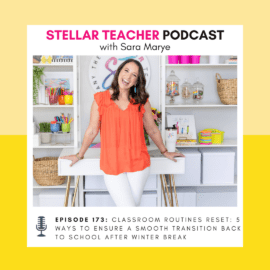
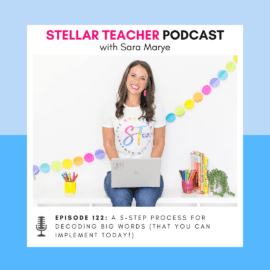
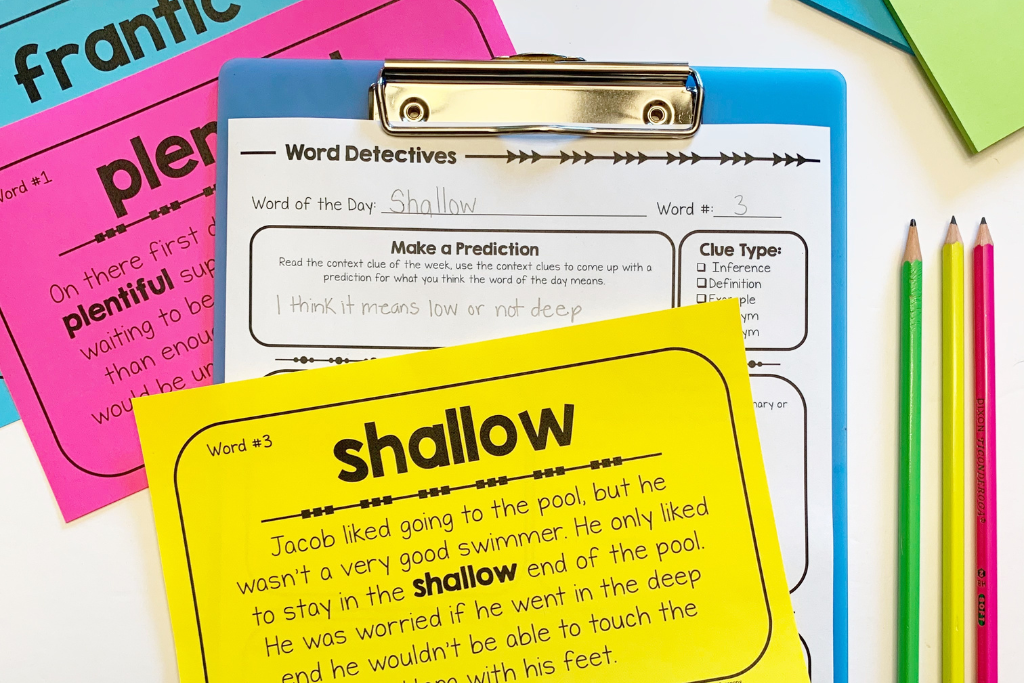

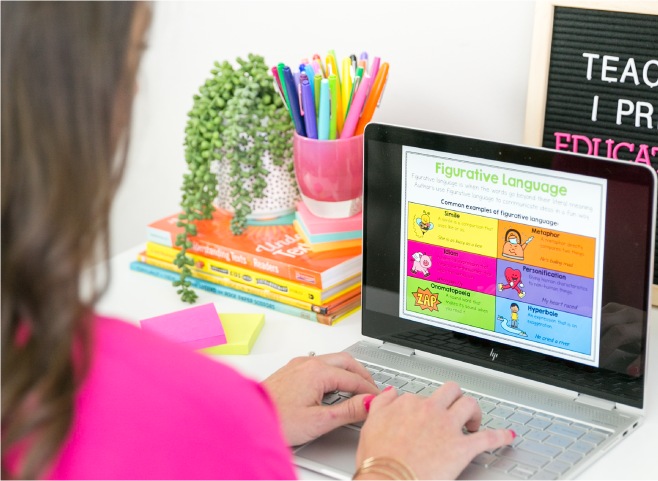
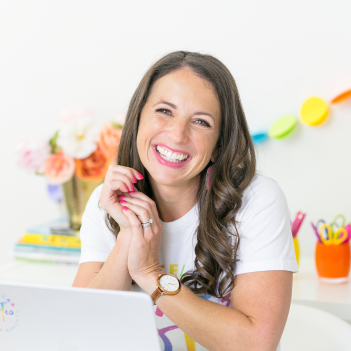
Leave a Comment
You must be logged in to post a comment.